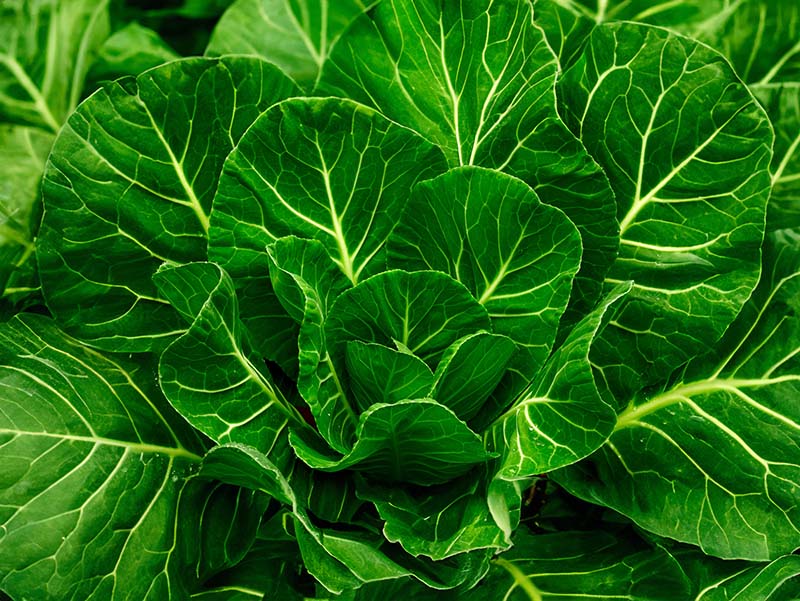“Is Collard Greens Good for Weight Loss?” Collard greens, characterized by their leafy green presence, are part of the esteemed Brassica plant family, alongside broccoli, cabbage, and kale.
Native to North America, these nutritious greens have been a staple in Southern American cuisine for centuries. Renowned for their rich nutritional value, collard greens are an excellent addition to a balanced diet, offering numerous health benefits, including potential weight loss advantages.
Read more
- Is Arugula Good for Weight Loss? Science-Backed Benefits.
- Is Asparagus Good for Weight Loss? Myths & Facts Revealed.
- Does Kale Make You Lose Weight? Superfood Secrets.
Is Collard Greens Good for Weight Loss?
Collard greens stand out as an excellent choice for those aiming to shed pounds. Their low-calorie yet fiber-rich composition works wonders in curbing appetite and diminishing hunger pangs. This naturally steers you towards a lower calorie intake, paving the way for effective weight loss.
Beyond just aiding in weight management, collard greens are brimming with vital vitamins and minerals, elevating their status as a nutrient powerhouse in your diet. Regularly including collard greens in your meals not only assists in weight loss but also fortifies your overall nutritional intake, making it a wise and healthful dietary decision.

Nutrient Content of Collard Greens
Let’s find out the impressive nutritional content of collard greens, according to the USDA. These green leafy vegetables are not only delicious but also nutritious:
- Calories: A one-cup serving of raw chopped collard greens contains a mere 11.5 calories, making them an ideal choice for calorie-conscious individuals.
- Fat: Collard greens are incredibly low in fat, with only 0.22 grams per cup.
- Sodium: They are also very low in sodium, with just 6mg per cup, which is excellent for those watching their salt intake.
- Carbohydrates: You’ll find 2 grams of carbohydrates in one cup of collard greens.
- Fiber: A standout feature of collard greens is their fiber content, boasting 1.4 grams per cup. Fiber is essential for promoting satiety and digestive health.
- Sugar: With only 0.2 grams of sugar per cup, collard greens won’t spike your blood sugar levels.
- Protein: Despite being a vegetable, collard greens provide a surprising 1 gram of protein per cup, making them a valuable addition to a plant-based diet.
- Calcium: Collard greens are a fantastic source of calcium, offering 83.5mg per cup. This is particularly beneficial for those who may not consume dairy products.

In addition to these essential nutrients, collard greens are rich in various vitamins and antioxidants:
- Vitamin K: Collard greens are an excellent source of vitamin K, which is vital for bone health and blood clotting.
- Vitamin A: They provide a healthy dose of vitamin A, important for vision and immune function.
- Vitamin C: These greens also contain vitamin C, known for its immune-boosting properties.
- Folate: Collard greens offer folate, a B-vitamin crucial for cell division and tissue growth.
- Beta-Carotene: They are a source of beta-carotene, a precursor to vitamin A, which acts as a potent antioxidant.
- Lutein and Zeaxanthin: Collard greens contain these carotenoids, which support eye health.
Health Advantages of Collard Greens
Collard greens, belonging to the brassica family of vegetables, offer a plethora of health advantages, making them a wise addition to your diet. Here’s a breakdown of the health benefits you can reap from incorporating collard greens into your meals:
Supports Fetal Development
Collard greens are rich in folate, a crucial nutrient for expectant mothers. Adequate folate intake, whether from food or supplements, plays a pivotal role in preventing neural tube defects, such as spina bifida, in developing fetuses.

Boosts Bone Integrity
The vitamin K content in collard greens is essential for maintaining healthy bones. Daily consumption of vitamin K helps the body absorb calcium, fortifying the foundation of your bones and reducing the risk of osteoporosis.
Enhances Cholesterol Profile
Collard greens are a source of soluble fiber, which can have a positive impact on your cholesterol levels. Soluble fiber binds with LDL cholesterol in the intestine, facilitating its excretion.
Additionally, it binds to bile acids, prompting the liver to produce more bile salts and use cholesterol in the process, ultimately lowering blood cholesterol levels.
Strengthens the Immune System
Collard greens provide vital vitamins A and C, which contribute to a robust immune system. Vitamin C supports healthy blood cells, while vitamin A is essential for the function of T-cells, a key component of the immune system that defends against invading pathogens.
Facilitates Regular Digestion
The soluble fiber in collard greens increases stool bulk, making it easier to pass, thus assisting in combating constipation.

May Reduce Type 2 Diabetes Risk
Research suggests that regular consumption of leafy greens, including collard greens, may lower the risk of developing type 2 diabetes. Antioxidants found in these greens may help protect against diabetes-related damage, while the fiber content can stabilize blood glucose levels by slowing sugar absorption from food.
Preserves Vision
Collard greens contain lutein and zeaxanthin, antioxidants known for their role in safeguarding against age-related eye conditions like cataracts and macular degeneration, contributing to maintaining good eyesight.

Contributes to Cardiovascular Health
Diets rich in produce, particularly green leafy vegetables like collard greens, are associated with a reduced risk of cardiovascular disease. The folate in collards aids in lowering levels of homocysteine, an amino acid linked to heart disease, blood clot formation, and arterial hardening.
Potential Cancer-Protective Effects
Consuming a plant-based diet, including collard greens, may decrease the risk of various cancers. These greens are rich in carotenoids and glucosinolates, which act as antioxidants and help protect against free-radical damage, as well as fend off DNA damage associated with cancer.

Can Collard Greens Harm Your Health?
While collard greens offer numerous health benefits, it’s essential to be mindful of potential interactions with certain medications and health conditions, as follows:
- Blood Thinners and Vitamin K: Collard greens are exceptionally high in vitamin K, a nutrient that plays a crucial role in blood clotting. If you are taking blood thinners, such as warfarin, maintaining a consistent intake of vitamin K is vital. Blood thinners work to prevent blood clot formation, and vitamin K promotes clotting. Therefore, it’s advisable not to drastically increase or decrease your consumption of collard greens if you are on a blood thinner, as it can affect the medication’s effectiveness. Always consult with your healthcare provider or a registered dietitian for guidance on managing your vitamin K intake while on blood thinners.
- Health Conditions: If you have any underlying health conditions or concerns about your diet, it’s prudent to discuss dietary changes with your doctor or healthcare professional. They can provide personalized advice based on your specific health needs, ensuring that any dietary choices, including the consumption of collard greens, align with your overall well-being and medication regimen.

Conclusion
In summary, “Is Collard Greens good for weight loss?” Yes, they are. Collard greens, with their low-calorie and high-fiber profile, are excellent for weight management and overall health.
However, be mindful of their interactions with certain medications. Share your collard greens experiences with us and explore more health insights on Sure Life Health‘s blog. Your stories can inspire and guide others in their wellness journey!
Professor Gaye Cunnane, PhD, MB, FRCPI
As the Director of Health and Wellbeing at RCPI, Professor Gaye Cunnane is at the helm of initiatives aimed at enhancing the health and well-being of RCPI Trainers and Trainees. Her role extends beyond administration; she is also a respected clinical professor of rheumatology and a consultant rheumatologist at Trinity College Dublin (TCD) and St James’s Hospital. Prof. Cunnane’s medical journey began at TCD, where she graduated from medical school, and her path has been marked by both clinical and academic excellence.
After completing her basic clinical training in medicine, she embarked on PhD studies at University College Dublin and St Vincent’s University Hospital. Her research during this period was focused on prognostic markers in early inflammatory arthritis, a project that saw her collaborating with esteemed universities across Europe, including in Switzerland, The Netherlands, the UK, and Sweden.
Prof. Cunnane’s career took her to the University of California, San Francisco, where she spent three years delving into research on new treatments for lupus. Her academic prowess led her to the University of Leeds in 2001 as a senior lecturer, before returning to Ireland in 2003 to assume her current roles. She has also served as the National Specialty Director for Rheumatology training in Ireland, Programme Director for Basic Specialist Training with RCPI, and as a past President of the Irish Society for Rheumatology.
PUBLISHED ARTICLES
“Rheumatic disease differentiation using immunoglobulin G sugar printing by high-density electrophoresis”: Published in The Journal of Rheumatology, this study reflects her in-depth investigation into rheumatic diseases.
“Benefits of exercise in patients with rheumatoid arthritis: a randomized controlled trial”: This research work, highlighting the positive impact of exercise on rheumatoid arthritis, underscores Prof. Cunnane’s dedication to practical, patient-centered research.
Additionally, Prof. Cunnane has made notable contributions to the Annals of the Rheumatic Diseases, discussing early referral, diagnosis, and treatment of rheumatoid arthritis. She has also been involved in a study on the NCBI platform investigating exercise benefits in rheumatoid arthritis patients.
Professor Gaye Cunnane’s career is a testament to her commitment to improving patient outcomes in rheumatology through rigorous research, clinical excellence, and dedicated teaching. Her work continues to influence the field of rheumatology, both in Ireland and internationally.

